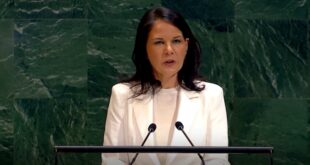Germany and Mozambique aim to uphold their political dialogue and step up economic relations, said Chancellor Angela Merkel following a meeting with President Filipe Nyusi in Berlin on 21 April. Germany, she added, would like to help secure peace in Mozambique.
Chancellor Merkel praised the traditionally good and cordial relations between Germany and Mozambique. Today, more than 3,500 people from Mozambique live in Germany. “They are a bridge,” she stressed.
Currently, Mozambique is seeing difficult developments. In addition to an economic situation which is hampering private sector development, parts of the country are in the throes of a drought that is posing a humanitarian threat. And Mozambique is facing the challenges of armed conflict.
Expanding development cooperation
In view of the fact that 1.5 million people in Mozambique are currently threatened by hunger, Dr Merkel stressed, “We, on the German side, have stepped up humanitarian aid for Mozambique, over and above normal development co-operation.” Germany is also working with Mozambique on projects in the fields of energy, climate change and flood protection, to help regulate water resources.
Alongside the existing development co-operation in the fields of education, good governance and climate projects, the Chancellor reported that they had discussed intensifying co-operation in agriculture. University twinning arrangements are an important factor in co-operation, she said. “Alumni, who studied here in Germany and are now back in Mozambique can act as important ambassadors and help increase co-operation in the education sector too,” underlined Merkel.
Development co-operation is one mainstay of German-Mozambican relations. Within the framework of bilateral development co-operation, Germany has already provided Mozambique with about one billion euros since the 1980s. The focus has been on education, vocational training, decentralisation for rural development and sustainable economic development.
Economic co-operation
President Filipe Nyusi stressed that he would like to step up bilateral co-operation in the economic sector in future. “Mozambique is a country that has a lot to offer, and Germany has a great deal of knowledge, technology, science and research. It is our priority to push ahead with development in cropping and agriculture.” In the energy and tourism sectors too, Mozambique offers great potential that must be harnessed, he declared.
The Chancellor pointed to co-operation with the private sector. The German private sector is interested in long-term, sustainable projects in Mozambique, she said, “for instance in making genuinely good use of the country’s raw materials – extracting them in line with the criteria of good mining. Major German companies are very interested in this, and in the infrastructure and electricity sectors,” she added.
Assistance in peace building
Both leaders also discussed the resurgence of the conflict between the Mozambican ruling FRELIMO party and the rival RENAMO organisation. Since all reconciliation efforts of the President Nyusi have failed and armed conflict has once again flared up, “everything must be done to return to a peaceful development”, said Angela Merkel. “Only a political solution will resolve the problems in Mozambique” and settle the existing conflicts.
The Chancellor revealed that she had offered President Nyusi Germany’s help in improving the opportunities for dialogue between the parties to the conflict within the European framework. For this, she added, it was very important “for me to hear directly from the President how he sees the situation and to hear that he is ready to engage in dialogue. I think that is one of the most important messages today.”
Bilateral relations between Germany and Mozambique are cordial and have been underpinned by many top-level visits. Bilateral economic relations have also developed a new dynamism in recent years. Mozambique is Germany’s fourth most important trading partner in the Southern African Development Community (SADC), after the Republic of South Africa, Angola and Namibia.
© www.bundesregierung.de
Chancellor Angela Merkel pledged German support to President Filipe Nyusi in the fields of development and security (© Bundesregierung/Bergmann)
 THE AFRICAN COURIER. Reporting Africa and its Diaspora! The African Courier is an international magazine published in Germany to report on Africa and the Diaspora African experience. The first issue of the bimonthly magazine appeared on the newsstands on 15 February 1998. The African Courier is a communication forum for European-African political, economic and cultural exchanges, and a voice for Africa in Europe.
THE AFRICAN COURIER. Reporting Africa and its Diaspora! The African Courier is an international magazine published in Germany to report on Africa and the Diaspora African experience. The first issue of the bimonthly magazine appeared on the newsstands on 15 February 1998. The African Courier is a communication forum for European-African political, economic and cultural exchanges, and a voice for Africa in Europe.



















